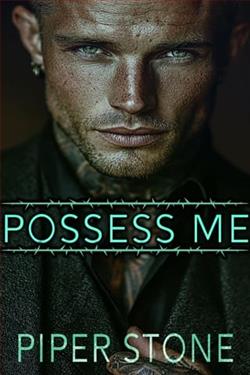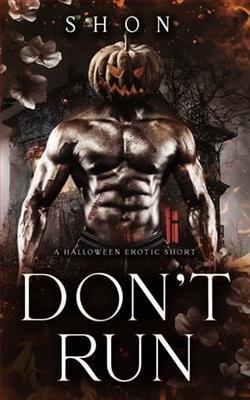Page 37 of Going Home in the Dark
Needless to say (but to ensure the clarity of this narrative, it will be said anyway) the four amigos congregated under an oak in the cemetery next door to the rectory shortly after darkfall. No doubt horse thieves and worse had hung from its branches, but no ornament of righteous justice dangled there now. The amigos were excited, wildly excited, as teenagers can be when doing something forbidden that they’ve persuaded themselves is justified in this instance.
No wall, fence, or hedge separated the graveyard from the rectory property. Crossing from Deadville to the back door of thepastor’s house would be safer than approaching from the street; there was little to zero risk of being seen.
The rectory wasn’t dark. Light glowed in two upstairs windows, also in a front room on the ground floor and in the kitchen.
The amigos had no concern about the lights. After two years in the choir and a full year as a trusted altar boy (during which his mother had tried to get him on Ritalin), Ernie was conversant with all things Saint Mark’s. He knew the security system was programmed to turn on lights when no one was home, creating the illusion that the house must be occupied. The existence of a security system here, when the church had none, provided no obstacle. It was a perimeter alarm only, with no motion detectors; the simple deactivating code was 1-1-1-3.
Although the amigos were geeks, they were not stupid. If they entered the rectory together and, against all expectations, someone happened to be in residence, at least one of four was likely to be snared, whereas a single intruder was pretty much certain to escape unharmed. Three of the friends agreed that Bobby should go in first to reconnoiter before the rest of them followed. Bobby harbored a different opinion, but he accepted the decision. Although he denied having charisma, hated the whole idea, he’d long ago realized that people had expectations of him that they didn’t have of everyone else. He tried to disappoint as many people as he could without offending them, including the girls who winked at him as if they shared some secret, but he could not refuse his amigos; they were the only family he had. On paper, the Pinchbecks were his foster parents, but Adam and Evelyn were ... vacant, uncommunicative; he knew little more about them than he knew about any two strangers he might see in the street.
So he left his amigos among the gravestones and went to the back porch of the parsonage and climbed the steps and peered through a window into the lighted kitchen, which was deserted. Years would pass before he learned about police lock-release guns. But he had been an inquisitive kid all his life, an autodidact, interested in arcane subjects, one of which was the techniques of professional burglars.
We should not think less of Bobby because of the places his curiosity led him. He didn’t have any intention of burglarizing anyone. He was not a thief. A boy can be fascinated with nuclear physics without wanting to blow up civilization, although if you know a boy like that, it is advisable to keep an eye on him.
Anyway, if Bobby hadn’t known how to gain entrance to the house quietly, if his sole option had been to break a window, which might have drawn unwanted attention, then he would not have remained there on the back porch. The story would end here, and many of you would be dissatisfied and possibly angry.
Having planned for this adventure, he’d brought with him a roll of painter’s blue tape. This material could be easily torn with his fingers. It had been in Spencer’s father’s garage workshop among tools and supplies that Spencer had not yet sold off. Rebecca had supplied a glass cutter that her grandmother Ruth had bought when she considered learning stained-glass windowmaking. Ruth gave up her stained-glass aspirations when she realized that any hobby would leave her with less time for the sugarcoated vitriolic exchanges and vicious tricks that made the golden years of marriage so satisfying.
The top half of the back door of the parsonage offered four small panes. Gloveless because his fingerprints were not on file anywhere, Bobby tore strips from the roll of tape and coveredthe pane nearest the lock. He used the cutter to score the glass along all four sides. Then he added a double thickness of tape, creating a hinge that fixed the pane to the muntin at the bottom of it. When he rapped the masked window glass sharply with one elbow, it broke with a softplinkwhere it had been scored. Without shattering or falling to the floor, the pane swung down and inward on its hinge.
Bobby reached through the opening he had made and found the thumb turn of the deadbolt and disengaged the lock. When he stepped into the kitchen, a musical trilling issued from the alarm panel on the wall to the right of the door. That pleasant, welcoming tune warned him that he had one minute to input the disarming code before the alarm would go off. He used the keypad to enter 1-1-1-3, and the trilling stopped.
A rush of triumphant glee lifted his heart. He surveyed the kitchen, grinning with delight. After a moment, however, he realized that anyone who witnessed his reaction might think he was fast on a road to a life of crime, when in fact he had great respect for the law. Suddenly he felt as if thousands of eyes were watching him, as if he were being judged by people who would understand his lawful nature, but also by people who would disapprove of what he’d done even if they had been told in no uncertain terms that he was not a thief. This uncanny feeling grew stronger, stronger, until he had to wonder if therealreason he was still in the kitchen was because he was a coward, afraid of what he might find in the rectory.
Of course he was not being watched. No invisible audience was following his every move. Angered by his reticence, he counseled himself to get on with a quick reconnoitering of these chambers. When he was sure no one was there, he would usehis walkie-talkie to urge his three amigos to join him for a more thorough search of the residence.
He made his way through the ground floor. Because a flashlight beam sweeping the rooms would look suspicious to anyone passing on Winkler Street, he boldly turned lights on wherever darkness ruled.
Although he really didn’t have any inclination to become a thief when he grew up, none at all, no matter what some unkind people might think, he climbed the stairs with the haste, agility, and silence of a cat burglar.
On the second floor, he discovered more of what he’d found downstairs, which was no one. He came at last to the room where the windows had been flushed with light before he’d broken into the house. He opened the door and stepped inside and found a library with floor-to-ceiling book-lined shelves on every wall.
In the center of the chamber stood an immense comfortable-looking armchair upholstered in burgundy leather. There were also a matching footstool, a small table next to the chair, and a reading lamp.
The most interesting thing in the room was the man who occupied the armchair, with his feet on the footstool. The first thing one noticed about this individual was his size. Because Bobby possessed neither a scale nor a tape measure, he could only estimate that the man was about six and a half feet tall and weighed two hundred fifty pounds.
This individual’s costume was as noteworthy as his size. He wore hobnailed boots that would damage any uncarpeted floor on which he trod. His jeans, which were tucked into the boots, appeared to be of a coarser denim than those sold by Levi’s or 7 For All Mankind. The red-black-and-green plaid shirt was wornwith the sleeves rolled up to the middle of his powerful forearms. A chain of small links of rusted iron encircled his neck, and from it hung a three- or four-inch claw from a grizzly bear. Atop this strange person, a navy-blue knitted cap perched like a workingman’s crown.
Bobby was reminded of the legendary lumberjack Paul Bunyan and could almost believe a giant blue ox waited in the backyard.
This embodiment of an American folk hero continued reading in spite of being interrupted by an intruder, as if the book fascinated him so much that he was determined to get to the end of a chapter before setting the volume aside.
Bobby knew he should pivot and run, but he could not move. Such was the giant’s effect on him that he might have peed his pants if he had not in fact had enough charisma to maintain his self-control and dignity. The grotesque figure in the chair filled him with a paralyzing dread that was not at once entirely explicable.
If there was anything good about being immobilized by fear, it was that this gave him time to analyze the reason for the profound nature of his dread.
In addition to the man’s massiveness, there was a quality about him that was alien. Something abnormal, unnatural, divergent, weird, heteroclite. Something hostile, bitter, poisonous. Something malign, malignant, venomous. Bobby could almost name what it was about the giant that he found most alarming, but the precisely right word eluded him.Filthy?The big man’s black hair was greasy and tangled. Sooty smudges mottled his face. Green teeth, dark stains in the crevices between them. Knuckles and fingernails encrusted with grime. His clothes hadbeen worn so long between washings that the fabrics were limp, exhausted. But no. Mere filth wasn’t what made him such a frightening presence.Eyes?They were green with orange striations, or perhaps orange with green striations. Bobby had seen blue eyes with green striations and gray eyes with blue striations, but he had never seen eyes like these. Yet again, no. The eyes were not the most unnerving aspect of the man.Hair?His facial stubble looked like something other than beard hair, something that had no name inthisworld, each bristle quivering as if it were a separate creature with a life of its own, growingonthe face rather thanfromit. The filaments in his eyebrows continuously, slowly writhed. The hair on his head seemed to be moving subtly, not as if armies of lice marched through it, but as if the hair was motile and ever so gently questing for something. No, no. It wasn’t the hair, either.
The most fearsome quality of that strange individual, the thing about him that might freeze someone in cold terror, eluded Bobby until—and long after—the giant closed the book and placed it on the side table and turned his attention to his visitor. We might expect such an apparition to have a deep and vibrous voice similar if not identical to that of Judyface and other horrific murderers who have slashed their way through countless movies, and that is indeed what Bobby expected. Instead, the giant proved to have the well-trained, sprightly voice of a game-show host. “Hello there, young man, Robert Shamrock, Bobby, Bobby the Sham to your friends.”
Astonished, Bobby said, “You know my name.”
Still in the armchair but as tense as a tarantula prepared to spring ten times its body length to seize its prey, the book loversaid, “You will win no prize for that observation, Bob, Rob, Robbie, Roberto.”
Although the giant’s voice was vivacious, a thread of mockery wove through his words, and his diabolical eyes all but smoked with hatred.
Bobby’s terror did not abate. He became aware of an astringent yet organic odor that was the very essence of alienness. “You know my name, but I don’t know yours.”
“Hornfly. Wayne Louis Hornfly.”















